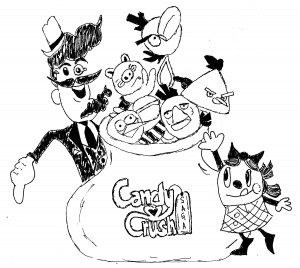How a Simple Game Became Our Worst Addiction

Candy Crush is the worst, most brilliant game I have ever played. I hate it. I love it. We have a troublesome relationship. My interest has survived much longer than my past gaming flings — longer than Gems with Friends, Scramble with Friends, and even Words with Friends. But the feelings the game inspires in me are timeless.
The good times are short and last for about five minutes, mostly contained in the first few seconds I eagerly pick up my iPod and wait for the game to load. It’s all downhill from there, involving overly-dramatic frustration and ending with me cursing the names of “whoever invented this damn stupid game.” This series of events led me to wonder why this game draws so many in, and why do we continue playing?
I began playing Candy Crush right before the start of summer, the prime time for addiction. Less schoolwork equals more time for students to lay in bed after work and watch Netflix on their computer or scroll through instagram on their smartphone. But instagram ends. Candy Crush, with its over 400 levels, never seems to end.
Candy Crush was created by King, a “casual-social games” company, whose most popular product by far is Candy Crush. In January 2013, Candy Crush surpassed Farmville as the most popular game on Facebook. It resembles Bejeweled in that you swipe matching icons in groups of three. Unlike Bejeweled however, there are obstacles, boosters, and charms, and you are never timed, you only have a limit on moves.
There are other appeals to the game. First, it’s free, although you can choose to pay for boosters or extra lives, which people do. As of July 2013, its 6.7 million active users were paying King $633,000 per day in order to take advantage of these addictive extras.
While I’ve never spent money on the game, every time I begin playing, I feel a pull, as if my brain is being tugged toward the candy-coated paradise of smartphone gaming. As it turns out, I wasn’t entirely wrong in thinking that I’m being roped in. The game takes advantage of what psychologists call the “partial reinforcement effect.” According to Kendra Cherry, the author of the Everything Psychology Book, which discusses topics ranging from social behavior to personality, the “partial reinforcement effect” is the act of “strengthening the behavior and increasing the likelihood that it will occur again in the future.” Because of Candy Crush’s unpredictable nature — the candies line up in different ways each game, increasing or decreasing your chances of making a match or getting a booster — each round leaves the player thinking “maybe next time, I’ll just play one more game”.
The game’s most obviously appealing level is the candy itself. We are playing a game that revolves around objects of childhood nostalgia and plays into our adult pattern-recognition skills. Candy Crush is full of patterns, and in fact, honors its players for finding them. We’re proud of ourselves when we do, and think we should be rewarded — with just one more game.
Candy Crush is a game for champions. My roommate’s friend is on level 300 and hasn’t used boosters or cheats. It is also a game for suckers. I heard from a friend who heard from a friend that their friend paid out of pocket over $1000 in order to beat the game.
It is a game for competitors. I actively try to race against my roommate and her boyfriend, although they don’t seem to care about this nearly as much as I do. And despite my overzealousness, it also creates friendships. I bonded with new co-workers this summer about the hardest levels to beat (levels 45, 65 and 95 were most hated), traded cheats (you can set the clock forward on your phone to bypass the five lives rule), and shared stories of glitches, broken phones and broken dreams.
Now that school has started again, I’ve noticed I don’t play as much. I don’t have as much time or opportunity. I can’t play while riding my bike and am luckily not addicted enough to try. My New York job doesn’t have as much downtime as my summer job did. This is probably a good thing, but I still grimace when I ask my roommate what level she is on and realize how far behind I am. I hope that one day I don’t care, but for now, please don’t talk to me about Candy Crush.







Leave a Reply